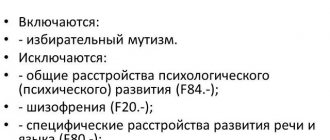Not all children are “incorrigible whys.” Some people prefer to remain silent because they are shy. And this is normal - when a child relaxes and gets used to the environment, he communicates without problems with peers and adults. But in some cases, a child’s complete silence in a given situation is not a consequence of low self-esteem. This is selective mutism.
Play-Doh
Play-Doh
The child babbles happily at home, but does not make a sound in kindergarten or school. Or vice versa - he communicates normally with his peers, but in front of his mother and father he becomes silent, so that words cannot be questioned. Situations familiar? Your child may need help speaking.
Selective mutism: what is it?
Selective mutism is also called selective muteness. According to medical references, it is a disorder characterized by a persistent inability to speak in certain situations, despite the preserved ability to speak normally in other situations. Selective mutism in the ICD-10 (International Classification of Diseases) is called selective mutism and is included in the section “emotional and behavioral disorders, usually beginning in childhood and adolescence.”
The topic of selective mutism is not very popular. And often children with this disorder cannot receive quality help for a long time - either parents do not attach importance to the child’s “strange” behavior, or doctors make erroneous diagnoses.
They started talking about selective mutism more loudly thanks to environmental activist Greta Thunberg. She was diagnosed with Asperger's syndrome and obsessive-compulsive disorder at the age of 11.
According to Greta Thunberg, selective mutism for her is a reason to speak only in cases “when it is absolutely necessary.” And indeed, Greta is quite emotional behind the podium, but at home she is mostly silent.
How does selective mutism manifest?
In adults, selective mutism is extremely rare. As a rule, the disorder makes itself felt at the age of 2-5 years. However, it often remains unrecognized until the child enters kindergarten or school.
The main complaint of parents of children with selective mutism: “my child is very capable, he speaks and reads at home, but in school the teacher cannot get a word out of him.” At the same time, adults cannot accurately indicate the age when their baby began to have problems with communication. Parents often say that their child has “always been like this”—anxious, withdrawn, shy.
The main symptom of selective mutism in a child is his inability to speak in a given situation. As a rule, these are large crowds of people and communication with adults. At the same time, the baby’s speech, when he is still not silent, may not have any defects at all.
According to the findings of Priscilla Wong, a pediatrician at the Department of Pediatrics in Washington, DC, children with selective mutism often exhibit other symptoms in addition to speech impediment:
- shyness;
- fear of large crowds of people;
- difficulty maintaining eye contact;
- difficulty expressing your feelings;
- sensitivity to noise and crowds;
- reluctance to smile.
Children with selective mutism are afraid of making mistakes and do not like to be the center of attention. Selective muteness is a kind of shield for the baby, which helps him remain invisible, so as not to suddenly attract attention to himself. But psychologists say that children with selective mutism often have high intellectual abilities and love art. But their development is hampered by difficulties in communication.
When is selective mutism diagnosed in children?
Most children are diagnosed between 3 and 8 years of age. Most children have a history of separation anxiety and slowness in warming up. It often happens that teachers tell parents that the child does not talk or communicate with other children. In other situations, parents will immediately notice that their child does not talk to most people outside the home.
Important!
If mutism lasts more than a month, parents should bring this to the attention of the doctor.
Reasons for the development of selective mutism
Scientists have so far refrained from identifying specific reasons for the development of selective mutism. But experts often associate the appearance of the disorder with increased anxiety in the child. In children diagnosed with selective mutism, the medical history in most cases is burdened by various anxiety conditions and social phobias.
Scientists have identified cases in which selective mutism syndrome developed after a child suffered psychological trauma. Little patients withdrew into themselves, stopped speaking in certain situations or were completely silent all the time.
Psychologists do not abandon another theory that would explain the development of selective mutism - heredity. It is believed that the disease can appear in children whose parents have anxiety disorders.
About 20-30% of children diagnosed with selective mutism have speech impairments, which only adds stress to situations in which the child must speak.
But doctors have not yet discovered a connection between autism and selective mutism. A child can have both diagnoses, but neither of them provokes the development of the other.
Diagnosis of Selective mutism in children:
Diagnosis requires differentiation of selective mutism in children with the following conditions:
1. Normality
Young children may be variable in their ability to be sociable or unsociable in unfamiliar environments or situations. Transient transient mutism at school entry may be an exaggeration of normal shyness.
2. Serious developmental speech disorders or acquired speech disorders
Speech disorders are said to occur when a child is uncommunicative in all situations and circumstances.
3. Autism spectrum disorders
They differ in that with selective mutism the child plays normally and interacts socially with family members.
4. Hysterical muteness
This diagnosis differs from selective mutism in children in that speech is not observed in all circumstances. The onset of hysterical muteness is sudden in most cases and is not usually preceded by pronounced lifelong shyness.
“Like a lump in the throat”: how children with selective mutism explain the inability to speak
To further study selective mutism, children with the disorder are often asked what prevents them from speaking in a given situation.
The answers are very different. “I can’t start talking, because then everyone will immediately pay attention to what I’m doing,” this is how a teenage girl explained her condition at an appointment with an American psychologist who was treating her.
Some older children describe the feeling of a large lump in their throat that prevents them from speaking.
Treatment
To treat selective mutism in a child, a set of measures is taken. Firstly, this is drug therapy, which includes:
- antidepressants;
- nootropics;
- serotonin reuptake inhibitors;
- neuroleptics.
These medications help reduce anxiety, relax muscle spasms, and relieve neuropsychic tension.
Secondly, the use of psychotherapeutic practices is mandatory. It is necessary to teach the patient other behavioral strategies, gradually displacing his usual ways of responding. Most often, work is carried out in the following psychotherapeutic areas:
- Cognitive behavioral therapy helps a person understand his condition and, at a behavioral level, learn to behave differently in difficult situations.
- Play therapy works with both children and adults: it helps to open up, relax, play out situations in imaginary conditions in which strong nervous tension arises, and behave differently in them than in reality. Over time, the behavior in them is transferred to communication in real conditions.
- Training methods for relieving anxiety, improving the quality of communication skills, and developing the ability to adequately interact with others.
Thirdly, often a child needs the help of a speech therapist. Since the speech apparatus does not work often and intensively enough, disturbances in its formation occur, resulting in diction defects. A speech therapist helps in the development of the speech apparatus and forms clear speech with clear pronunciation.
The wider the range of treatment methods, the greater the chance of complete recovery. But you can’t overdo it: exercising too often can cause stress and lead to aggravation of the situation. It is better to start with a minimum number of sessions, and then, when the child is ready, gradually expand their range.
Treatment of selective mutism
When parents attribute a child's complete silence in certain situations to shyness and withdrawal, they miss the opportunity to take timely measures to help their child communicate normally.
Clinical psychologist and ABA therapist Ekaterina Olegovna Matsapura explains how selective mutism in children is treated.
“If the disorder is not corrected, selective mutism will continue to develop into adulthood. It is very important to understand: mutism is not a temporary phenomenon; it cannot be “outgrown”!
What should parents do if their child suddenly stops speaking in kindergarten, school, or with some relatives? First of all, we need to conduct a mini-diagnosis in order to make sure that we are dealing with mutism and not another disorder similar to it. Observe your child's behavior.
- Assess what situation causes silence and whether this behavior is permanent for her. For example, you know for sure that at home the child learned this verse and told it to you perfectly, but at school or kindergarten he simply cannot utter a word.
- See how the child behaves in a comfortable situation, when he is alone or with loved ones. Is he involved in games, can he support and initiate dialogue?
- Does the inability to speak interfere with a child’s normal adaptation to society?
- The inability to speak lasts at least a month and is situation-specific.
- The inability to speak is not a consequence of other mental and behavioral disorders, such as autism spectrum disorder.
If these diagnostic criteria reflect your situation, it's time to intervene.
Only you yourself, your hard work, and inclusion in therapy completely and completely can help your child. Under no circumstances should you wait for a magic pill. Even the most qualified specialist will not “fix” a child without proper parental support.
Because the nature of the disorder is unclear, treatment for selective mutism is best approached through psychotherapeutic behavior modification. For example, ABA therapy, cognitive behavioral therapy and direct behavioral therapy.
The emphasis in correcting the disorder is precisely on changing the behavior of parents and a supporting group of people - teachers, speech therapists, educators, nannies. A child with selective mutism is most often afraid of any attention to himself, as this causes him to feel severe anxiety. Therefore, it is most painless and effective to teach parents new behavior strategies.
It is important that loved ones can promptly and delicately encourage the child’s behavior and retreat when necessary. The basis of behavioral intervention is the gradual elimination of unwanted behavior through reinforcement and training in replacement behaviors.
With prolonged exposure to selective mutism, other mental disorders may occur - anxiety, depression, phobias. And therefore you should seek medical help from a psychiatrist. This is especially important for children with advanced mutism, as well as for adults with this disorder. Pharmacotherapy helps alleviate the condition, increasing the chances of successful psychotherapy.
The effectiveness and result of assistance will also depend on the coherence of the team. All adults around him should participate in the child’s adaptation and teaching him to “speak.”
Why does mutism develop?
The reasons, as modern medicine suggests, lie in the effect of an excessively intense stimulus on the nervous system. Lack of speech or a complete refusal to respond to the world around us is a kind of defense mechanism. The speech organs and brain are fine; formally, there are no organic reasons for the development of such a complex process. But there is a problem. Why? The reasons are psychological. Among the immediate ones:
- Mental trauma
Especially heavy. If a person has become a witness, or even worse, a participant in a traumatic incident. For example, a terrorist attack, military action, an accident with the loss of loved ones, etc. In such a situation, the brain tries to protect itself from negative influences. Everyone is equally exposed to risks, regardless of the nervous system’s resistance to stress. Mutism can occur in any patient.
- Mental abuse
As a rule, it is observed in relationships that are implicitly or explicitly built on the principle of power and subordination. An authoritarian parent is a powerless child, a tyrant spouse is a wife placed in a dependent position, and other options.
The two named reasons cover most of the clinical situations in the practice of neurologists and psychiatrists. Others have an organic basis. But their share is small. No more than 15% of the total number of situations. Moreover, among these 15%, the leadership is held by schizophrenia and autism spectrum disorders in children.
Mutism may be part of the negative symptoms of paranoid or catatonic schizophrenia. The pathological deviation is successfully corrected with antipsychotic drugs in the correct dosage. Although not always. The task is not easy. Lack of speech usually coexists with profound personal changes, degradation and splitting of the patient’s “I”. Therefore, normal speech may be absent for other reasons related to the progression of the disease.
Autism and its variations are one of the key causes in patients under the age of 12 years. In this case, a undulating course occurs (wavy: the intensity of symptoms either decreases or increases), which is rather typical for childhood schizophrenia.
The cause is dissociative disorders. Disturbances in the processes of higher nervous activity. Hysterical disorder stands apart. Mutism is an unconscious reaction to a minimal mental stimulus. A patient with this diagnosis seeks to be the center of constant attention. Manipulative attempts are unconscious, at least up to a certain point.
Organic pathologies develop even less frequently:
- HIV encephalopathy - damage to the brain by the AIDS virus (characterized by severe symptoms of dementia, personality destruction, complete loss of cognitive functions, mutism is one of the first to occur);
- brain tumors (malignant or benign);
- brain injuries.
Some practitioners and scientists classify symptoms of damage to the vocal cords, speech apparatus, and cerebral structures into this category. But most experts are against such an unreasonable expansion of the list of cases when we can talk about a disorder. Here there are purely organic reasons for the inability to speak, and not psychological ones.
How parents can help their child
Do not put pressure on your child, do not force him to speak!
It is better to support your child and talk to him about topics that concern him, showing in every possible way that you are on his side.
Encourage your child to communicate by changing the environment. Visit places that resonate with your child more often. Focus on pleasure. Let him talk excitedly about the movie he watched or his trip to the water park.
Play with your child, learn to receive positive emotions and give them. Praise for interacting and playing with other children.
Praise delicately! Selective mutism does not tolerate aggressive encouragement. It is better to change the usual verbal praise into tokens or stickers. Create a reward system at home that will be clear to your child. Answered today at school - keep the chip. Collected 7 chips in a week? Get the ice cream! Be sure to ask the little person what he would like as a reward for his own work.
Create a visual schedule so your child knows what to expect during the day. Write it down in as much detail as possible, especially paying attention to those situations in which it is difficult for the child. Try to be neutral in your description, showing only the facts and giving the child ways to cope with the situation. For example: “if you want to leave the class, raise your hand, wait for the teacher’s question and ask if you can leave.” These measures will help reduce anxiety.
Don't be too emotionally surprised when your child does speak. Let this be the norm. Don't focus on the fact that there was something "wrong" with him.
For older children, individual support and approach are recommended, since mutism at this age is strongly mediated by the environment. In this case, it is imperative to consult a psychologist.”
- share with your friends!
Experts: Ekaterina Olegovna Matsapura
Diagnosis of mutism
The process of recognizing the disease includes an analysis of complaints and anamnesis of the disease, namely:
– how long ago the patient stopped speaking, answering questions, or moving;
– what immediate event influenced the cessation of speech (severe emotional shock, loss of consciousness, traumatic brain injury).
A neurological examination includes an assessment of the presence of speech and reflexes, eye opening, assessment of the respiratory rhythm, measurement of arterial (blood) pressure, as well as a search for other signs of neurological pathology to find the cause of mutism (facial asymmetry, impaired eye movements, strabismus).
EEG (electroencephalography). This method evaluates the electrical activity of different parts of the brain.
MRI (magnetic resonance imaging) or CT (computed tomography) of the brain: these methods study the structure of the brain layer by layer and find out the cause of brain dysfunction.
If necessary, a consultation with a psychiatrist and speech therapist is prescribed.









